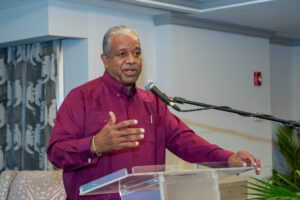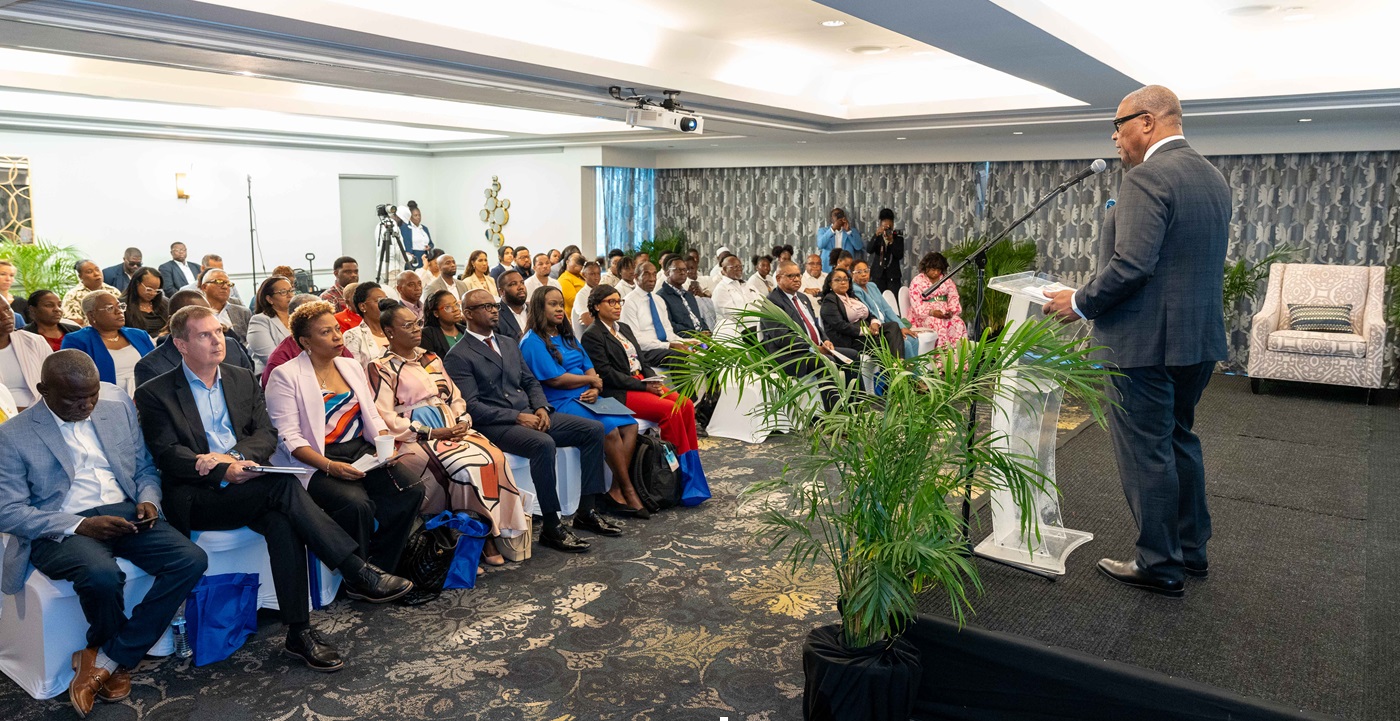CONSIDER THIS …
“Some people regard private enterprise as a predatory tiger to be shot. Others look on it as a cow they can milk. Not enough people see it as a healthy horse, pulling a sturdy wagon.” Winston Churchill
As published in the Nassau Guardian, June 10, 2024 – On Friday, June 7, 2024, Counsellors Limited staged the first-ever Turks and Caicos Islands (TCI) Business Outlook (the Business Outlook) at Beaches Resort, Villages, and Spa on Providenciales. By any objective measure, the event, which was attended by ninety participants, was an outstanding success. Drexwell Seymour, Managing Partner of HLB TCI Ltd., and Deandrea Hamilton, CEO and Consultant of Magnetic Media, moderated the historical event. The theme for the Outlook was “Opportunities for Growth and Inclusion for All TCI Stakeholders.”
Therefore, this week, we will Consider This … what were some of the highlights of the first TCI Business Outlook?
Keynote address
The Hon. Charles Washington Misick, MP, Premier of the TCI, delivered the keynote address. During his remarks, Premier Misick highlighted some of his government’s fiscal results over the past few years and the challenges that the jurisdiction faces in the years ahead.
The Premier observed that the TCI has been very successful, particularly in the management of its fiscal matters. He also shared that the TCI Government’s budgeted 2023-24 revenue was $415 million, a healthy budget surplus of $56 million, and the government had accumulated no national debt. He confirmed that his government had approved more than $1 billion in investment in the tourism sector. In addition, he stated that investments of another half a billion dollars were in the pipeline and that, over the next two years, the tourism plant would increase by at least 1,600 new hotel rooms. While most of those investments will be made in Providenciales, high-end brands such as Marriott will be developed on some of the other islands in the Turks and Caicos.
The Premier also noted that his social budget had increased from $3 million to $10 million since coming to office, recognizing that it was important that no Turks Islander be left behind. He also alluded to the need to rationalize taxes so that they are more equitably applied across disparate social groupings.
Tourism drives the TCI economy
The Hon. Josephine Connolly, MP, Minister of Tourism, Environment, Heritage, Maritime, Gaming, and Disaster Management, built on Premier Misick’s presentation regarding the role tourism plays in TCI economy. Tourism drives the TCI economy, according to the Minister of Tourism, accounting for nearly 80% of the gross domestic product, most of which is centered in Providenciales.
In 2021, the United States was the main market for inbound tourism in the Turks and Caicos Islands, making up more than 80% of the nearly half a million stop-over visitor arrivals registered in that year.
This was confirmed by Stacey Cox, CEO of Turks & Caicos Hotel & Tourism Association, and Alvin Hegner, Chairman of Experience TCI, both of whom delivered presentations on tourism and its importance to the jurisdiction. The Turks and Caicos Hotel & Tourism Association is dedicated to fostering sustainable growth in tourism for the benefit of its members and the wider TCI community.
Experience TCI is the tourism authority responsible for promoting the Turks and Caicos Islands as a premier travel destination and boosting the number of visitors, enhancing their experience, and thereby driving economic growth and sustainability in the Turks and Caicos Islands through a thriving tourism sector.
Catalyst for growing business
Angela Musgrove, CEO of Invest TCI, and Paul Pirie, CEO of TCI Finance, delivered presentations on the Catalyst for Growing Business. Invest TCI was established to assist local and foreign investors in accessing government concessions for investing in the Turks and Caicos islands and to provide investors with introductions to local service providers/suppliers. On the other hand, TCI Finance has a mandate to grow the jurisdiction’s financial services sector in competition with other financial offshore centers such as The Bahamas, the British Virgin Islands, and the Cayman Islands. The presenters outlined their plans for achieving their objectives.
Mr. Pirie noted that financial services presently account for less than 10% of the island’s gross domestic product, which he hopes to grow to 30% in the years ahead, notwithstanding the sustained assaults that similar offshore financial sectors experience from the OECD and the Financial Action Task Force. Some participants questioned TCI Finance’s ability to achieve such an aggressive objective considering the existing regulatory framework in which the offshore financial sector currently operates.
The sessions on Access to Capital and The Future of Banking were presented by Kerryl Lyn King-Henry and Terrance Gibson, the Country Managers of the Royal Bank of Canada and CIBC, respectively. Both presenters addressed the challenges that its current and prospective customers face in accessing capital and the steps the banks are taking to address those challenges. In addition, Mr. Gibson addressed the challenges that some of the bank’s customers face regarding access to banking services on some of the smaller, more remote, and less populated islands in the Turks & Caicos Islands, similar challenges that Bahamians face on similarly placed islands within its archipelago.
Modern healthcare services
The session on Committed to Health and Innovation was extremely interesting in terms of both the content and the timeliness of the information imparted to Outlook’s participants. Mr. Dennis Deveaux, CFO of Doctors Hospital Health Systems in The Bahamas, and Dr. Denise Brathwaite-Tennant, CEO of TCI Hospitals, updated the audience on the latest offerings by both organizations, highlighting that world-class medical services are available at both institutions and that both organizations are constantly reviewing how they can improve their services locally in order to avoid patients from seeking modern medical treatment abroad.
Infrastructure
Honorable Jamell Robinson, MP, Deputy Premier, and the Minister of Physical Planning and Infrastructure Development, delivered a presentation on “Addressing Infrastructure and Housing Challenges.” The Minister informed the participants that the demand for residential housing will be between 8,500 and 13,000 new homes and apartments over the next few years. He advised us that most of this demand is being generated by the growth in the economy, principally in the tourism sector, and that affordable housing will continue to be a major challenge for his ministry for the foreseeable future.
The Minister also spoke about some of the infrastructural developments that will take place in the Turks and Caicos, with great emphasis on improving the Providenciales International Airport. That improvement has been pegged at approximately $400 million and is projected to begin later this year.
Minister Robinson also discussed the need for the government to address the congestion that has arisen on Providenciales and what his government intends to do to expand the road corridors throughout the island. He noted that his ministry will provide infrastructural development for airports on the neighboring islands of the TCI.
Mr. Devon Cox, Vice President of Operations at Fortis TCI, the electric company made a presentation on the country’s electricity infrastructural needs. He informed Outlook that in light of the anticipated increase in the number of hotel rooms and other ongoing development projects on the islands, the need for reliable, affordable electricity would increase exponentially and that Fortis has developed a master plan to address the demand. He also provided an analysis of the power infrastructural developments that will take place on the other islands of the archipelago.
Mr. Delano Arthur, Executive Director of the Energy and Utilities Commission, informed the audience about some of the plans to regulate the utilities industries in the TCI. The Energy and Utilities Commission plays a very similar role in the TCI to that of URCA in The Bahamas. Although it is not statutory, plans are being made to establish the Energy and Utilities Commission as a statutory body shortly.
shortly.
The Bahamas diaspora
The day’s final session was entitled “The TCI-Bahamas Diaspora—Embracing a New Mindset of Collaboration.” Ms. Vernae Mills, Executive Director of the TCI Bahamas Diaspora office in Nassau, Bahamas, addressed the participants on the role that the office plays in assisting Turks Islanders who live in The Bahamas and encouraging and facilitating their return to take advantage of opportunities in the TCI.
Conclusion
As we indicated before, the first-ever TCI Business Outlook was a stunning success. This Business Outlook was historical because it was the first time that The Counsellors Limited has hosted this successful series outside The Bahamas. As Mrs. Joan Albury observed when she summarized the day’s event, “We hope that this will be an annual feature in the TCI business calendar, and we will make every attempt to host it early in the year, so then it becomes much more meaningful and effective for its participants.”
Our countries, The Bahamas and the Turks and Caicos Islands have been intertwined for centuries, two tiny specks of the giant British Empire, together in an azure sea. To continue our relationship in the 21st century, in this instance in the realm of business, has the potential to promote productivity for our two countries that share geography, climate, backgrounds, customs, and success stories. To, once again, using the effective TCI Business Outlook as the forum, come together to mutually benefit our countries is historically appropriate and very satisfying to those of us who live in this little corner of the diaspora


 TCI News1 week ago
TCI News1 week ago
 News5 days ago
News5 days ago
 Bahamas News2 days ago
Bahamas News2 days ago
 News4 days ago
News4 days ago
 Bahamas News1 day ago
Bahamas News1 day ago
 News6 days ago
News6 days ago
 Caribbean News5 days ago
Caribbean News5 days ago
 Health1 day ago
Health1 day ago













